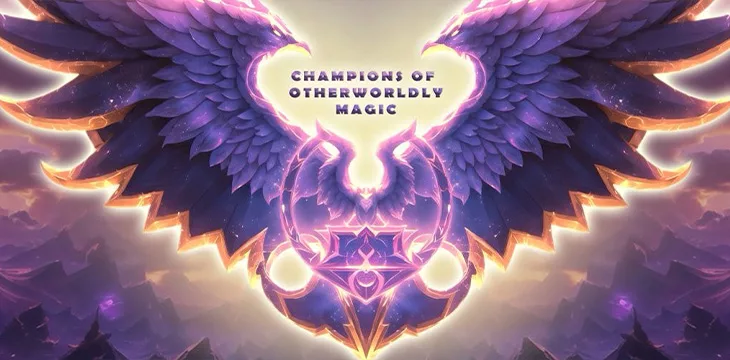|
Getting your Trinity Audio player ready...
|
Ordinals Wallet launched the mint of additional CoOM Battles 1st Edition trading card NFTs on BTC. The mint of 30,000 cards was completed in 60 hours, alongside $60,000 in secondary market trading volume. 30,000 cards were minted for 13,000 satoshis of BTC, around $4 as of writing. This mint follows the initial 1st edition sale of 10,000 cards on the BSV blockchain earlier in the summer, bringing the total supply of 1st edition cards to 40,000.
Sold Out! Here’s some info on the mint
🔮Sold out 30k cards in about 60 hrs
🔮4.5k holders+
🔮2 BTC+ in secondary volume
🔮2000+ games played (game is alpha af)I thought ordinals were ded?
Set a reminder for our Space tonight! 🔮https://t.co/rzTMoe5Rj3
— Champions of Otherworldly Magic 🔮 (@ChampionsTCG_) July 30, 2023
This time, the card game is playable, and a meta is starting to form, combined with additional card supply on two different blockchains, the market is in an odd state. Rarity proportions for the BTC mint were preserved, so each Champion saw its supply increase by an additional 300%; for example, instead of 25 Ooga, there are now 100.
The initial mints resulted in around $160,000 in revenue, which is significant given how quickly the sales lasted (total less than 96 hours). Thus, the incentive is to print more cards at the cost of quelling the secondary market, which had found stability on the BSV blockchain before the news of a second mint was scheduled. Of course, players need more cards available and at reasonable prices to play the game, which caused a raging debate after the BTC mint was completed, sparked in a now-deleted tweet, where Ordinals Wallet questioned if another 70,000 cards should be minted for that reason.
After much pushback by community members in the CoOM Battles Discord, the official Twitter account clarified that only 30,000 1st edition cards will ever exist on BTC.
TO CLARIFY: ONLY 30K FIRST EDITION CARDS WILL EVER EXIST ON BTC. 🔮
Any future mints will have different skins making them easily distinguishable from 1st ed.
Example 👇: 2nd edition Guaess could be pepe skin and only stats would remain the same so gameplay isn’t affected https://t.co/AV3tlkvVpF pic.twitter.com/HyBY1ZOI7i
— Champions of Otherworldly Magic 🔮 (@ChampionsTCG_) July 30, 2023
This debate is nothing new in the TCG (Trading Card Game) world, as well-established games such as Magic: The Gathering (MTG), Pokémon, and Flesh and Blood constantly face this balancing act. Most notably, Flesh and Blood had this exact issue in 2021, where the first three sets had very small print runs (roughly 70,000 boxes total), causing the secondary market prices to skyrocket and many complaints about the cost being too high to play the game.
As such, Flesh and Blood repeated the mistake that Wizards of the Coast (WotC) made with MTG in the 90s, overprinting subsequent sets after their notorious Alpha, Beta, and Unlimited sets were in high demand. Legend Story Studios (LSS) jacked up the print run of the 4th set, Monarch, to 125,000, crushing the secondary market box prices that had reached a high of $500 down to as low as $80.
The decision to inflate is so enticing because the card company (and its distributors) earn money for each card sold and wants to sell as many cards as possible to as many players as possible. However, speculators want a healthy, liquid secondary market, especially in the digital currency space. Historically, TCG companies earn zero from the secondary market, adding to the incentive to print. With blockchain, companies can at least earn royalties from sales on public marketplaces.
The actual utility of NFTs has been a foreign concept in this industry to date, which is why a liquid secondary market is desired, and the strong pushback at the prospect of inflation. To balance this once and for all, after the fallout from their overprinting in the 90s, WotC created the Reserved List, which is a list of cards that will never be reprinted to preserve their secondary market value. CoOM Battles may have anticipated this, as they have already established this concept with their Genesis Collection of 1540 cards on the BSV blockchain.
There will only ever be 1540 “genesis airdrop” cards in circulation. These cards have skins that will not be available in our 1st edition mint next week 👀🔮 https://t.co/eYZYC50c5g
— Champions of Otherworldly Magic 🔮 (@ChampionsTCG_) June 10, 2023
CoOM Battles held a Twitter Space to discuss this topic and more after the mint. Regardless, the fact that debates are happening, the game is being played, and speculators are passionate is a sign the game is headed in the right direction. Check out the game now at CoOMBattles.com.
CoinGeek Roundtable with Joshua Henslee: 1Sat Ordinals on Bitcoin

 02-22-2026
02-22-2026 




